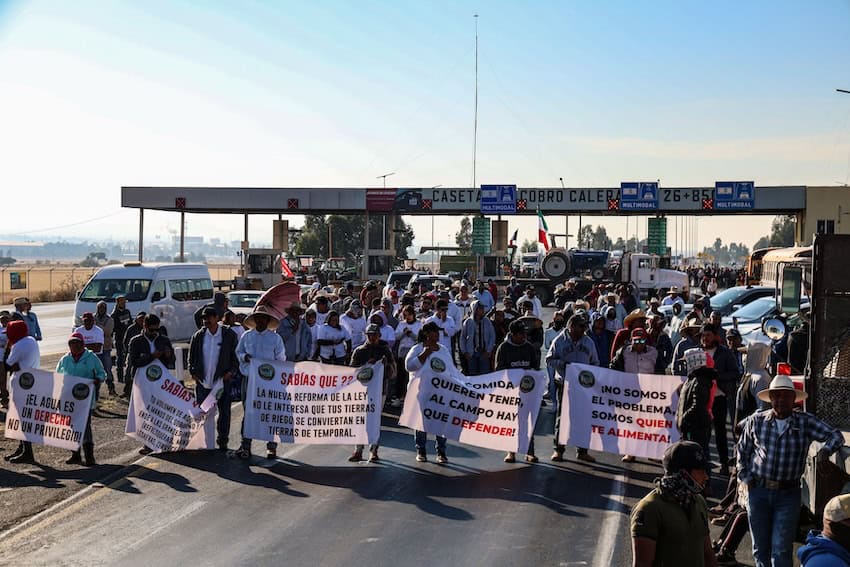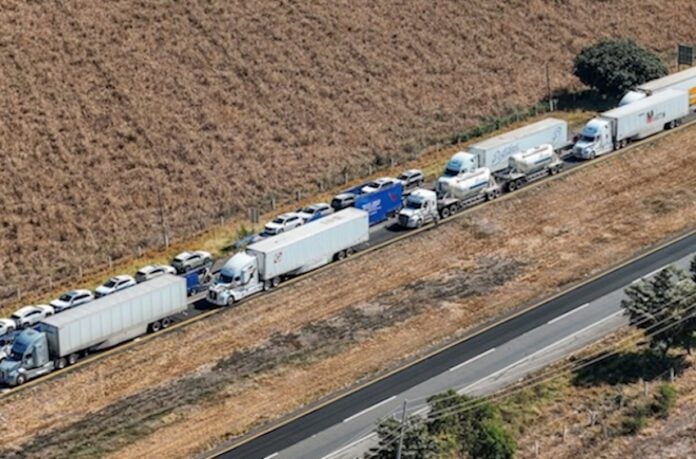The mega-blockades shutting down highways and hindering truck access to U.S. ports of entry extended into a fourth day on Thursday, triggering significant delays in the transportation of goods, generating ripple effects throughout the supply chain and hampering freight deliveries, food distribution and cross-border trade.
At the same time, a crack of light came through the darkness as negotiations with the Mexican government were showing early signs of bearing fruit. The Interior Ministry was hosting talks with farmers Thursday, a day after meetings between protesters and lawmakers on Wednesday showed promise.

The blockades were initiated by the ANTAC truckers association and the FNRCM farmers association (the National Front for the Rescue of Mexican Farmland). ANTAC is demanding better security on Mexico’s roads while the FNRCM is seeking fairer conditions for the agricultural sector and voicing opposition to a proposed water law.
Baltazar Valdez, a delegate of a farmers association in the state of Sinaloa, told the newspaper Reforma he saw determination among lawmakers to address farmers’ demands regarding water.
Deputy Ricardo Monreal, the leader of the ruling Morena party’s caucus in the Chamber of Deputies, agreed to establish a permanent working group to address farmers’ concerns, while Valdez said a draft proposal is already in the works.
“We have a proposal that includes provisions for protecting the rights of agricultural producers,” Valdez said before he and others resumed talks with Interior Ministry Undersecretary César Yáñez and Agriculture Minister Julio Berdegué on Thursday.
The alliance between farmers and transporters took shape earlier this month, with both sectors arguing that they face similar structural problems, including a lack of security, pressures from monopolies and criminal groups and unsustainable operating costs.
Organizers defend the need for the blockages that affect not only the nation’s economy but also the daily life of Mexican residents by accusing the government of having ignored the demands of farmers and truckers
President Claudia Sheinbaum has dismissed that rationale. “There is no reason for these protests because there is a permanent working group in place,” Sheinbaum said on Tuesday. “Dialogue has been ongoing.”
The toll of the blockages
Full and partial road closures were reported in at least 22 states on Wednesday, with more than 50 locations affected, according to the newspaper Reforma.
Although the roadblocks focused on commercial traffic, blockades extended to highway toll plazas and federal roads in the western state of Michoacán and elsewhere on Thursday.
‘One water, one law’: Citizen movement challenges Mexico’s new water bill
The Mexico-Guadalajara highway was shut down near four toll booths in Michoacán and there were intermittent closures reported by federal operators on the Cuernavaca–Acapulco highway, as well as the Mexico–Querétaro highway.
The roadblocks have triggered significant delays in the transportation of goods, generating ripple effects throughout the supply chain. Freight deliveries, food distribution and cross-border trade have suffered as a result.
The protest has caused accumulated losses of between 3 billion and 6 billion pesos (US $163 million to $327 million), according to the Confederation of National Chambers of Commerce, Services and Tourism (Concanaco-Servytur).
“This is a prudent estimate that seeks to quantify the economic damage while a negotiated solution is being developed,” the Confederation stated, citing public reports from authorities and business organizations in 17 states.
The National Confederation of Mexican Transporters (Conatram) estimates daily losses in excess of 100 million pesos (US $5.5 million), including fuel waste and contractual penalties for missed delivery deadlines.
Companies have begun to reroute shipments, postpone travel and assess operational risks, while logistics providers have been forced to produce contingency plans to minimize the impact.
With reports from Reforma, El Universal, La Jornada, El Economista and KTSM News
